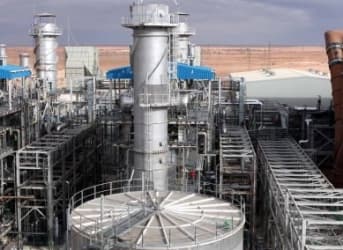The largest natural gas producer in Africa is overhauling its laws in order to halt the decline of production, which has stagnated for more than a decade.
Algeria is the continent’s largest natural gas producer and the second largest supplier of gas to Europe (Russia is the largest supplier). It is also the third largest oil producer on the continent after Nigeria and Angola.
Algeria is blessed with abundant fossil fuel reserves, and it is even estimated to hold the world’s third-largest shale gas reserves, according to the Energy Information Administration. With over 700 trillion cubic feet of technically recoverable shale gas reserves, Algeria even rivals the U.S. in terms of the amount of gas locked away beneath its territory.
However, despite the large bounty, Algeria has overseen a long gradual decline in both oil and gas production. The EIA says that delays in new drilling and new infrastructure projects are the culprit. As a result, the Algerian government reformed its energy laws in order to attract international investment, which it believes will help reverse production declines. Related: Low Oil Prices Make This Stock A Good Long-Term Bet

The state-owned operator Sonatrach is still required by law to take majority ownership (at least a 51 percent stake) in new oil and gas projects. But Algeria has offered up stakes for auction, including 33 blocks that attracted interest from international companies. The government signed five contracts with Repsol, Shell, Statoil, and Dragon Oil-Enel.
Sonatrach has a multiyear investment plan that will result in $64 billion spent in upstream activity over the next three years. The company is not only seeking to halt production declines, but it plans on increasing output from 1.4 million barrels of oil equivalent per day (MMboe/d) to 1.6 MMboe between 2014 and 2019. Related: How Russia’s Energy Giant Imploded

As mentioned above, Algeria is a major supplier of gas to Europe. Much of that occurs through three transcontinental gas pipelines, two of which travel to Spain (one through Morocco and the other via the Mediterranean) and one that transits the Mediterranean to Italy. The largest, the Enrico Mattei Pipeline, carries 1.34 trillion cubic feet per year from Algeria through Tunisia and then on to Italy.
Algeria became the first country in the world to ever ship liquefied natural gas (LNG) when it brought an export terminal online in 1964. Today it is a significant LNG exporter, the seventh largest in the world with 12.8 million tonnes per annum (mtpa) of capacity. Related: Could WTI Trade At A Premium To Brent By Next Year?
But as Algeria’s production has fallen, so too have exports, threatening the country’s economy. More than 95 percent of Algeria’s export earnings come from exporting oil and gas. Between 2012 and 2013, exports fell by 10 percent which created the urgency to attract investment in order to increase output.
Algeria is not alone in this endeavor. Its neighbor to the west, Morocco, is also scrambling to roll out the red carpet for international companies. Morocco has a much smaller energy sector, and is in fact a net energy importer. It produces unremarkable levels of oil and gas, but the same shale reserves that are located in Algeria also stretch across the border into Morocco. In June a small Irish company, Circle Oil, announced gas flows from a well in Morocco.
“We are delighted that our first well on the Lalla Mimouna block has such positive results, flowing gas at significant rates,” Circle’s CEO, Mitch Flegg, said in a June 2015 statement. “The productivity of this first well is very encouraging for the expansion of Circle's portfolio of Morocco gas fields.”
But Morocco’s 20 tcf of recoverable shale gas reserves is a fraction of what might be possible in Algeria. In 2014, Sonatrach started a pilot project to drill and hydraulically fracture three horizontal wells in the Ahnet Basin, according to the EIA.
Attempts to successfully tap shale oil and gas reserves outside of North America have disappointed. China and Argentina have been at the center of analysts’ expectations for the next location for rapid increases in shale production, but North Africa – especially Algeria – is doing its best to be the one to replicate the shale revolution.
By Nick Cunningham of Oilprice.com
More Top Reads From Oilprice.com:
- Even The Saudis Need To Borrow To Survive Oil Price Slump
- The Link Between Oil Reserves And Oil Prices
- Global Oil Supply More Fragile Than You Think

















